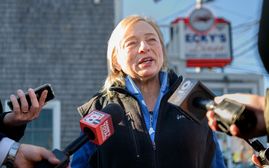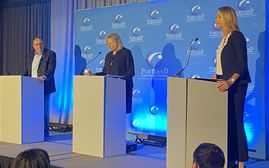Politics & Co.: LePage shows he knows when to fold 'em
For the better part of 2015, Gov. Paul LePage steadfastly refused to issue more than $11 million in Land for Maine's Future bonds approved by Maine voters in ballot questions dating back to 2010.
Ostensibly, he held those bonds hostage as a bargaining chip in an ultimately unsuccessful bid to get lawmakers to agree to his plan to increase timber harvesting on public lands in order to fund a heating efficiency program for needy Maine families.
But there's ample evidence the governor has a deeper personal antagonism toward the program that has helped conserve more than 500,000 acres of working forests, farmland and commercial working waterfronts through land sales or conservation easements since its creation in 1987. Repeatedly characterizing it as a program for the rich, the governor launched an investigation last spring, briefly froze its operating funds and delayed filling vacancies on the nine-member LMF board.
Then, reversing course in the year-long impasse with lawmakers and a host of LMF supporters over the frozen conservation bonds, LePage announced on Dec. 14 he would release $5 million of unexpired bond funds approved in 2012. He also nominated three new members to the LMF board — Bob Meyers of the Maine Snowmobile Association; Harry Ricker of Ricker Hill Orchards; and Fred Bucklin, who runs a property appraisal company. Their confirmation hearings by the Legislature's Agriculture, Conservation and Forestry Committee are scheduled for 1 p.m. on Feb. 23.
Soon after the 127th Legislature reconvened in January, both the House and Senate unanimously approved a bill reissuing the $6.5 million of LMF bonds voters authorized in 2010 that had expired during LePage's standoff with lawmakers.
What's behind these sudden reversals?
One possibility: The long-awaited report on the LMF investigation LePage launched last spring, which was quietly released by the Governor's Office of Policy and Management in late December. The 194-page systematically debunks the governor's oft-repeated claims the program is corrupt, only serves the rich and needlessly removes land from tax rolls. The 194-page report offers a fact-filled analysis that persuasively shows the 28-year-old program to be transparent and conscientious in evaluating dozens of funded proposals that have protected working waterfronts, saved farmland from development and expanded public recreation opportunities in every Maine county.
A companion report released on Jan. 26 by the 175-member Land for Maine's Future Coalition builds on those findings. The 42-page report states the LMF program since its inception has:
- Helped to leverage 40 farmland projects across 10 counties, countering the rapid loss of farmland in Maine.
- Protected 24 working waterfront projects in six counties, preserving the livelihoods of 1,280 fishing families and ensuring access for 637 fishing vessels.
- Strengthened Maine's outdoor recreation industry by ensuring public access to more than 570,000 acres of land in 200 projects throughout the state.
- Conserved more than 250,000 acres of working forestland using conservation easements that supported 2,200 jobs and contributed $170 million to the state's economy.
- Leveraged $3 in additional investments by project partners for every $1 in state money invested in land conservation through the LMF program.
- Returned $11 in direct economic activity and benefits to the Maine economy for every $1 invested.
None of this appears to have changed LePage's mind. He refused to sign the bill reauthorizing the $6.5 million LMF bonds that had expired last year, telling Maine Public Broadcasting Network on Jan. 21, “It will go into law without signature.”













Comments